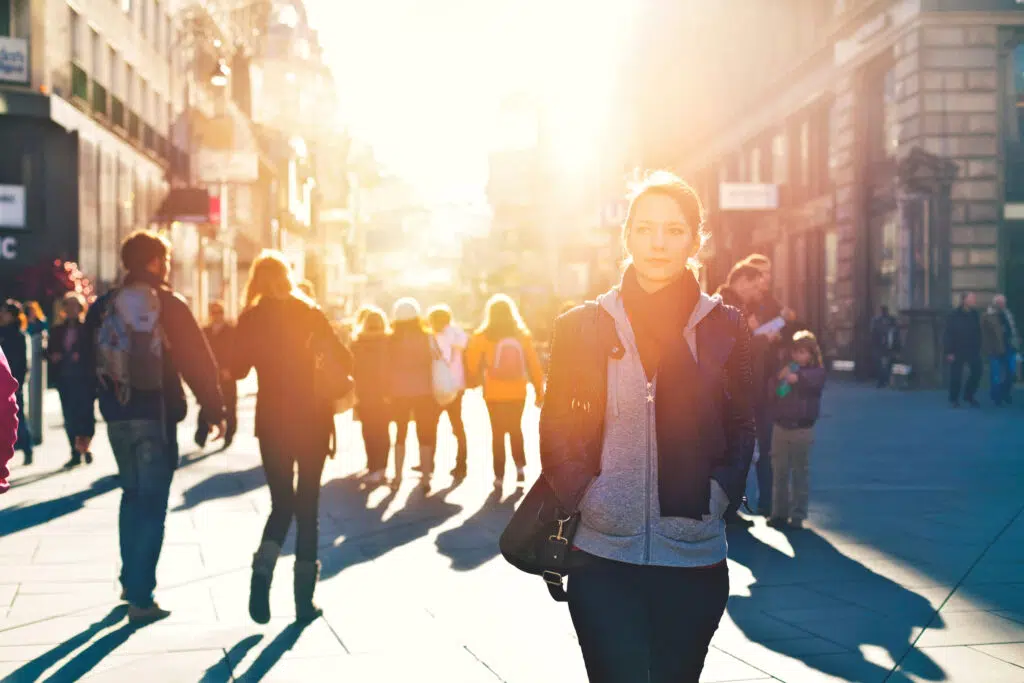Mental Health Effects of Living in a City

Large cities tend to have a lot of concrete and higher crime rates. They are fast-paced and busy, and everyone is trying to get somewhere quickly. Many people tend to think of living in a city as having a detrimental effect on mental health. It’s easy to view living in a city as either good or bad, but it’s more complicated than that. The relationship between mental health and living in a city is complex.
Dr. Tirrell De Gannes, a licensed clinical psychologist in New York, says, “as a person that has lived in multiple cities, the common positive effects are; you can have a higher chance of finding a place that has the community you’d like to be surrounded by, there are more options to engage in self-care, and your expectations for others is more nuanced.
Conversely, you can become more jaded in some city environments, you have a higher chance of being stressed given the competitiveness of jobs and crowding, and you can easily feel like you’re just one of many.”
Depression and City Living
In some cases, living in a city can increase your risk of mental health issues like depression, anxiety, and stress. But, at the same time, urban living presents opportunities for education, employment, and expanding your social circle.
One study found that living in larger urban areas in the US is linked to lower levels of depression. Researchers found that those living in a city are more likely to have larger social networks, including work, friends, and family connections. Social isolation is a risk factor for depression. This study focuses on depression and living in dense urban cities.
Mental health is a spectrum. It’s difficult to measure mental health across the board in a city. Some mental health problems may benefit from living in a city, but other areas may be worse. Pre-existing and social factors also play a role in mental health. For example, unemployment, break-ups, previous trauma, and overload in an urban setting can all influence mental and physical health.
The Importance of Green Space in Cities
Over the past few years, the importance of green space and nature has become clear. With cities in and out of lockdowns, having a green space and going for a daily walk outside became the highlight of the day. It was the thing that kept many people sane. Fast forward, and the importance of green space in cities is higher than ever.
Research shows that exposure to nature, greenery, and parks benefits mental health. Those who spend time in nature report higher levels of health and well-being. Stepping out in nature can also generate positive emotions like calm, joy, and creativity. A connection to nature is associated with lower levels of depression and anxiety.
“Green space is so underrated when it comes to city planning. The calmness and beauty of nature in the city is a wonderful juxtaposition to the hustle and bustle of a city environment. If you can be near any parts of nature, I highly recommend it. Nothing equates to hearing the sound of wind blow through trees as you lay on the grass,” says Dr. Tirrell De Gannes.
With that knowledge, it shows that having access to green space, especially in dense urban settings, is important. Parks, green corridors, and rooftop gardens all count towards green space and feeling more connected to nature. Research shows that access to green space helps people to recover from mental fatigue.
A demanding job, life events, and prolonged stress can leave you in a state of mental fatigue. It essentially means you’re exhausted mentally and, in some cases, physically. An extensive body of research shows the link between nature exposure and health. So, green spaces could positively impact mental health in built-up urban cities.
Anxiety and Living in a City
As you will know, mental health can take on many forms. Urban city dwellers are 21% more likely to have anxiety disorders. But no difference was found for substance use disorders.
So why can cities increase your risk of anxiety and some mental health issues?
Several studies look to identify factors that highlight potential problems of living in large cities. Factors include:
- Reduced access to green space
- Higher levels of noise and air pollution
- Loneliness
- Perceived and actual crime rate
- Social inequality
The constant stimulation from a city can take its toll on your mental health. Stress and burnout can make you more vulnerable to mental health issues.
While these factors may increase the risk of mental health problems, it’s not all doom and gloom. Urban living can also offer benefits to people, such as employment or specialized care. Ultimately, cities can challenge and nurture our health and well-being. It’s still down to the individual person to check in on their stress levels, work out, eat healthily, and do those things that support a healthy and happy mind.
The Stress of the Daily Bustle
Living in a city can be stressful. The daily bustle of the commute, heavy traffic, pollution, crowded transport, and the growing cost of living are all stressful. There’s no hiding that these elements can stress you out.
While you may have a larger social circle, traffic may get in the way of visiting your friends. Wading through a crowd of people or paying for an overpriced movie may sound small, but annoyances can add up over time and chip away at you.
Coping with the stress of a city isn’t about moving away to the country but finding ways to deal with the stressors. Over time, this can help you to bolster your emotional and physical well-being and prevent burnout.
How to Combat the Mental Health Effects of City Living
Whether you live in a city or a suburb, you can still experience stress and mental health issues. By finding a way to manage stress, you can handle everything life throws at you with more control.
Dr. Tirrel De Gannes says, “I’d suggest that you create a sense of community in whatever neighborhood you live in. Go to the same stores and restaurants, talk to the same neighbors, etc.
Next, I’d recommend budgeting time every week to explore your surroundings on foot. Walking around a city helps you to appreciate it more and gives you a better sense of direction.
Finally, I would recommend looking for your comfort item/action. Love being in nature? Find the nicest park. Love exercise? Find the nearest gym or workout class. Enjoy sweets? Find the closest bakery or dessert place. You get the idea.”
Create a Work/Life Balance
Creating balance in your life is crucial. Balance is important whether it’s in a healthy diet, exercise, work, or home life. 84% of millennials say they have experienced burnout in their current job. Prolonged and unmanageable stress at work leads to burnout, with a quarter of professionals never or rarely taking a vacation day.
Your work/life balance can help you to set boundaries so that you enjoy your time both out and in the office. Finding a balance that works for you is essential for your mental well-being.
Find a Way to Unwind
Whether it’s going for a walk in the park, running every morning, or never missing your post-work yoga session. Spend time outdoors, see friends, and cultivate a community you can lean on in good and bad times. Living in a city can increase your exposure to stressors, but if you can find a way to release some stress and boost your mood, you can cope with stress more efficiently.
Regular physical exercise can reduce stress and anxiety, increase self-esteem, help you sleep better, and improve focus. You probably already know that exercise is good for your body, but exercise’s effects on mental health are huge.
Get a Good Night’s Sleep
When it feels like a city never sleeps, it’s tempting to stay up so you don’t miss out on the action, but a lack of sleep doesn’t put you in the best position to combat the daily bustle. Most people know that a bad night’s sleep can make you feel moody. But sleep deprivation can have a negative effect on your emotions, with 21% of adults feeling more stressed without enough sleep.
If you’re struggling to cope with the mental health effects of living in a city or would like to learn how to manage stress and anxiety more effectively, contact The Thriving Center of Psychology. Our team of dedicated psychologists can help provide you with the tools you need to support your mental well-being.
Schedule an online appointment or contact one of our offices in New York, Florida, Los Angeles, Minneapolis, Princeton, and Portland.

Sustaining Love: What to Do When the Honeymoon Phase Fades
There’s nothing quite like that initial attraction and spark where you just can’t get enough of your partner. But as the months and years roll on, it’s normal for relationships to transition through stages, and dynamics can shift.

All a Bad Dream? 1 in 4 Think Their Nightmares Predicted the Future
Americans have a lot on their minds. From navigating daily stress due to work or mental health to grappling with bigger widespread issues like politics, climate change, or crime, it’s safe to say there’s a lot to think about daily. For many, stressors aren’t only encroaching on their minds during waking hours, but also when they try to sleep in the form of nightmares, or bad dreams.

Psychological Challenges with Remote Working
While we can meet our loved ones in person without masks, the pandemic brought some changes that have stuck. Remote working has transformed the workforce. Some companies have chosen a fully remote approach, while others are welcoming their employees back to the office full-time.

Survey: 72% of Americans are Stressing About the Upcoming Presidential Election
Political viewpoints in the U.S. have always been contentious, but is the impact of politics in the United States making it difficult for people to live their everyday lives? With some anticipating another brutal and long campaign season ahead of the upcoming 2024 presidential election, nearly half of Americans say politics is negatively impacting their mental health.




